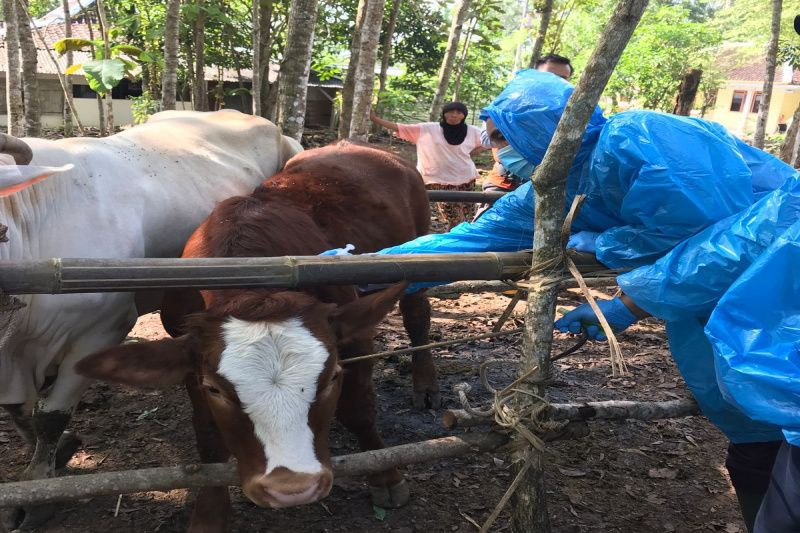Popular Reads
Top Results
Can't find what you're looking for?
View all search resultsPopular Reads
Top Results
Can't find what you're looking for?
View all search resultsGovt steps up efforts to curb anthrax after outbreak kills 3 people
The first deceased tested positive for the bacterial infection, while the other two showed clinical symptoms of anthrax, according to the health official.
Change text size
Gift Premium Articles
to Anyone
H
ealth authorities are scaling up efforts to curb the spread of anthrax in Gunung Kidul, Yogyakarta, following an outbreak that has infected dozens of local residents and killed three people.
Anthrax is a highly contagious zoonotic disease that typically affects livestock and can cause blackened skin, sores, vomiting, shock and meningitis.
Humans can contract the disease by breathing in the spores of the Bacillus anthracis bacteria, consuming contaminated food or drinks or through direct exposure to wounds on infected animals, their meat or their hides.
Anthrax has been used in bioterrorism attacks but is also still prevalent in many parts of the developing world.
Imran Pambudi, the Health Ministry’s director for infectious disease prevention and control, said that the outbreak started on May 18 when a cow belonging to a resident of Candirejo village in Gunung Kidul suddenly died.
“The owner cut up the dead cow and distributed the meat to other residents as part of a local tradition called purak or brandu,” he said in a press briefing on Thursday. “From May 18 to June 4, the Candirejo residents consumed at least three dead livestock in their village.”
Purak or brandu refers to the slaughtering of dying farm animals for their meat to be distributed freely for fellow locals in the spirit of community and communal care.
Read also: Indonesia on alert amid increase of Marburg virus disease outbreak
Local authorities previously surmised that residents had dug up and consumed dead livestock that officials had previously disinfected and buried in order to contain the spread of the disease.
The first anthrax-related death in the village was reported on May 25, followed by a second, four days later, and the third fatality on June 4. The first deceased tested positive for the bacterial infection, while the other two showed clinical symptoms of anthrax. All three took part in the cutting up of the contaminated meat.
Although anthrax is considered endemic in Yogyakarta and infections are reported in the province almost every year, Imran said the latest incident was the first time since 2016 that the disease had caused human deaths there.
The case fatality rate for anthrax, he continued, ranges from 25 percent for cutaneous (skin) exposure, between 25 and 75 percent for gastrointestinal incidents and up to 80 percent for inhaled cases.
As per Thursday, at least 87 residents had tested positive for the bacterial infection, although only nine were symptomatic. So far, at least 12 livestock have died from the disease.
Stepping up efforts
Nuryani Zainudin, the director for animal health at the Agriculture Ministry’s husbandry and animal health directorate general, said that authorities were increasing anthrax surveillance in Gunung Kidul regency both among the human population and livestock.
“We tried to track down where the sick animals were cut up and where the meat was distributed so we can disinfect the area to kill the spores. We are also collecting soil samples in the village to find areas that have been contaminated,” she said on Thursday.
Read also: Increase national preparedness in facing pandemics
Anthrax spores may remain dormant in the soil for decades and resurface when the soil is disturbed, such as by flooding, torrential rains or landslides. The disease typically reappears when the spores are ingested by grazing farm animals.
Nuryani also said that authorities had injected hundreds of at-risk animals with antibiotics and vitamins throughout the regency and will ramp up anthrax vaccination in surrounding regions to prevent the spread of the disease.
They will also track down at-risk animals to prevent farmers from selling livestock that are herded together in a single pen with dead or sick animals.
The Agriculture Ministry’s director for veterinary public health, Syamsul Maarif, said that authorities would also form what is to be called “zoonotic cadres”, as a part of wider community-based disease surveillance efforts.
“These cadres will be tasked with reporting zoonotic cases and informing the public about the dangers of purak or similar practices. They will also educate the masses that distributing contaminated meat is a crime,” Syamsul said.
According to Article 344 of the Criminal Code, those who sell and distribute meat from sick livestock could face a prison sentence of up to six months and a fine up to Rp10 million (US$660).










